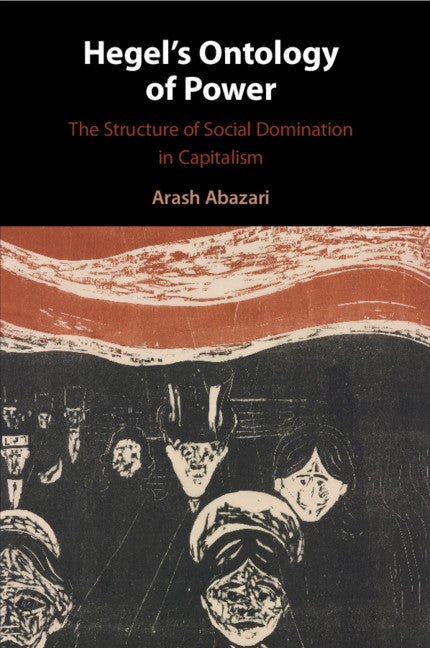Freshly Printed - allow 8 days lead
Couldn't load pickup availability
Hegel's Ontology of Power
The Structure of Social Domination in Capitalism
This book develops a genuinely critical theory of capitalism based on Hegel's Science of Logic.
Arash Abazari (Author)
9781108792325, Cambridge University Press
Paperback / softback, published 4 November 2021
236 pages
22.9 x 15.3 x 1.3 cm, 0.354 kg
'This book is a penetrating and highly original attempt to think with Hegel, against Hegel. Arash Abazari argues that Hegel's most profound contribution to social theory lies not in his conception of institutionally mediated freedom, but in 'the logic of essence', out of which Abazari extracts a theory of power and social totality which he then uses to shed new light on later radical social theories such as those of Marx and Adorno. A fascinating and trenchantly argued work.' Todd Hedrick, Michigan State University
Recent attempts to revitalize Hegel's social and political philosophy have tended to be doubly constrained: firstly, by their focus on Hegel's Philosophy of Right; and secondly, by their broadly liberal interpretive framework. Challenging that trend, Arash Abazari shows that the locus of Hegel's genuine critical social theory is to be sought in his ontology – specifically in the 'logic of essence' of the Science of Logic. Mobilizing ideas from Marx and Adorno, Abazari unveils the hidden critical import of Hegel's logic. He argues that social domination in capitalism obtains by virtue of the illusion of equality and freedom; shows how relations of opposition underlie the seeming pluralism in capitalism; and elaborates on the deepest ground of domination, i.e. the totality of capitalist social relations. Overall, his book demonstrates that Hegel's logic can and should be read politically.
Introduction
1. Illusion or semblance
1.1 'Socially necessary illusion' in Adorno
1.2 Semblance in the logic
1.3 The dialectic of semblance
1.4 The logic of ideology in Marx
2. Opposition
2.1 The fundamentality of opposition
2.2 The dialectic of the determinations of reflection
2.3 Opposition as domination
2.4 …and the logical proof for it
2.5 The 'truth' of diversity in opposition
2.6 Opposition between capital and labor
2.7 …and between genders
2.8 Conclusion
3. Totality
3.1 Society as totality in Adorno
3.2 Two misconceptions of totality
3.3 Actuality
3.4 The critique of Spinoza's substance
3.5 Substance as absolute power
3.6 The 'spell' of totality
4. Capital as totality
4.1 The critique of methodological individualism
4.2 Capital as the dialectical unity of circulation and production
4.3 The circuit of capital
4.4 The reproduction of capital
4.5 The power of capital
5. The necessity of totality
5.1 The preliminaries
5.2 The critique of the cosmological proof
5.3 The dialectic of necessity and contingency in the logic
5.4 …and in capitalism
5.5 The illusion and contingency of freedom
5.6 The critique of pluralism
Conclusion: the failed transition to the realm of genuine freedom
Works cited
Index.
Subject Areas: Social & political philosophy [HPS], Western philosophy, from c 1900 - [HPCF], Philosophy [HP]


